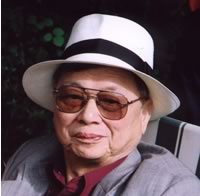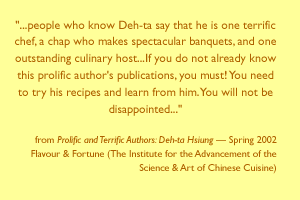

|
|


I was born into a family of scholars and gourmets in old Peking, which is now known as Beijing (bei means 'north', and jing is the 'capital'), and travelled widely throughout China as a teenager. I had a traditional classical Chinese upbringing before coming to England at the age of 17 to complete my education at Oxford and in London, where I now live.
On graduation from the Slade School of Fine Art in 1960, I worked in films first as an Assistant Director, and then as an Editor until the mid-80s. But from the mid-70s, I also began to write articles and books on Chinese cuisine, and I also started to teach Chinese cookery, as well as acting as a food and wine consultant to Chinese restaurants and food manufacturers.
I'm basically self-taught, although I did take lessons from some of the top chefs both here and in Hong Kong. I have also worked in professional kitchens throughout the world. So what I was trained to do has become a hobby, and what was my hobby is now my profession!
I've contributed to several websites in the past, but my main aim for starting chinese-at-table.com is to demystify some of the misunderstandings that surround one of the greatest cuisines in the world. The history and traditions of China are inextricably linked to its food culture, and its geographical and physical diversity has also shaped a rich cultural heritage and influenced the style of the culinary art, now so popular the world over.
Over 5000 years of history are behind some of the various traditional dishes that have now permeated into Western society, but little is known of their origins. Here I would like to mention the late Barbara Tropp, a China scholar turned Chinese cook, who wrote in her wonderful book The Modern Art of Chinese Cooking (William Morrow 1982):
The book begins with philosophy, moves through techniques, and then moves on to food. It follows my belief that when you set out to master Chinese cooking it is Chinese philosophy that is your foundation, Chinese cooking techniques that supply the bricks and the mortar, and the delicious food that follows is then the natural result and the crowning glory. Without philosophy to give it sharp, Chinese food is shallow. Without technique, it falls apart. It is like a special house that one cannot hope to build from the pinnacles down.
Chinese food is fascinating and delicious and I hope my web site will encourage you to learn more about it, and most of all, to enjoy cooking and eating the Chinese way.
